Theme Park History: Disney's America and the historian's dilemma
Published: November 1, 2013 at 7:44 AM
Twenty years ago a debate raged between Disney and some concerned Americans on the relationship between history and theme parks. The Disney corporation hoped to tap into the tourist market that visited Washington D.C. and northern Virginia and began marketing the proposed park as a complement to the many museums and battlefields in the area. The actual construction spot was to be just a few miles away from the Civil War site of the Battle of Manassas (Bull Run for you Northerners) in Prince William County, Virginia.
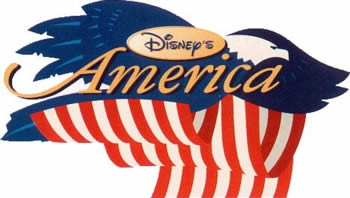 The proposed park was entitled Disney's America and would have featured several lands, each depicting a different era of American history. The focal point to the park featured the turbulent 1860s. This area came complete with a Civil War era town and a military encampment with costumed Union and Rebel soldiers and a Rivers of America-esque lagoon where patrons could witness a fight between the ironclads Monitor and Merrimack (technically the CSS Virginia for the historically minded).
The proposed park was entitled Disney's America and would have featured several lands, each depicting a different era of American history. The focal point to the park featured the turbulent 1860s. This area came complete with a Civil War era town and a military encampment with costumed Union and Rebel soldiers and a Rivers of America-esque lagoon where patrons could witness a fight between the ironclads Monitor and Merrimack (technically the CSS Virginia for the historically minded).
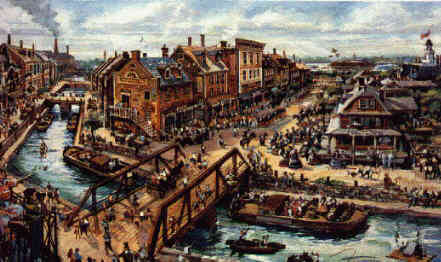 From there visitors could explore President's Square which centered on the nation's origins and included a Hall of Presidents show. Victory Field played to the nostalgia of the Greatest Generation and depicted all manner of aircraft utilized in the World Wars. The thrill seekers in the crowd would have enjoyed Enterprise Town which depicted America's history of industry and innovation, including the roller coaster "Industrial Revolution" which promised to fling riders around a steel mill, complete with blast furnaces.
From there visitors could explore President's Square which centered on the nation's origins and included a Hall of Presidents show. Victory Field played to the nostalgia of the Greatest Generation and depicted all manner of aircraft utilized in the World Wars. The thrill seekers in the crowd would have enjoyed Enterprise Town which depicted America's history of industry and innovation, including the roller coaster "Industrial Revolution" which promised to fling riders around a steel mill, complete with blast furnaces.
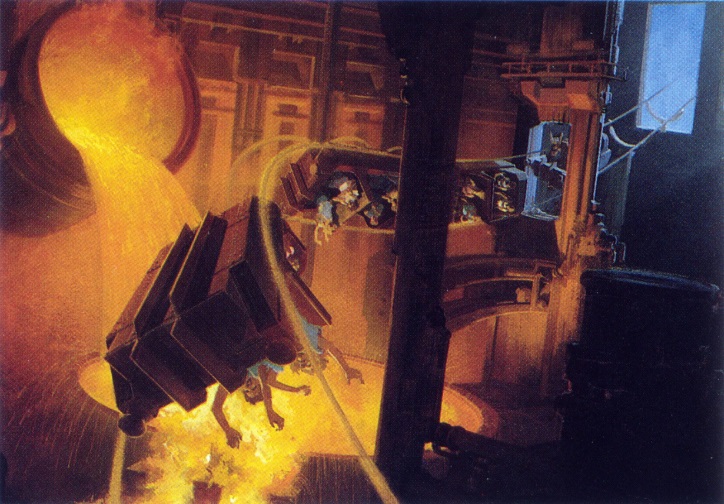 To cool off you could check out Native America which would have included a white-water rafting ride emulating the Lewis and Clark Expedition. (No word if an audio-animatronic Sacagawea would have made an appearance but I would like to think so).
To cool off you could check out Native America which would have included a white-water rafting ride emulating the Lewis and Clark Expedition. (No word if an audio-animatronic Sacagawea would have made an appearance but I would like to think so).
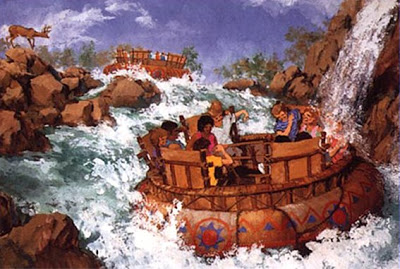 There was even a good old fashioned State Fair area that showcased how Americans could unwind even amidst economic turmoil such as the Great Depression. Patrons could also celebrate the multi-cultural heritage of America by visiting a recreation of Ellis Island in the We the People
There was even a good old fashioned State Fair area that showcased how Americans could unwind even amidst economic turmoil such as the Great Depression. Patrons could also celebrate the multi-cultural heritage of America by visiting a recreation of Ellis Island in the We the People
land.
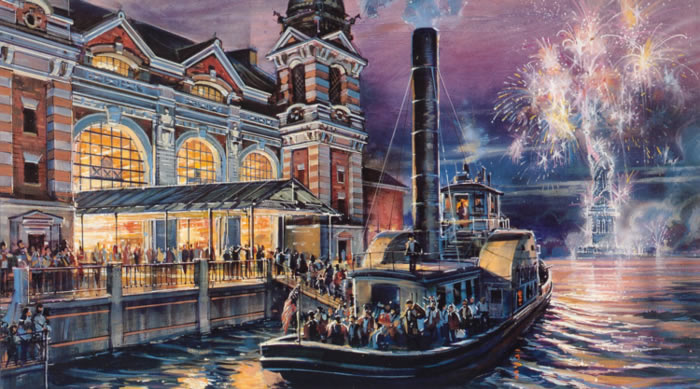 But it was not meant to be. Some local residents of Prince William County balked at the massive proposal and feared the new park would lead to an abundance of gaudy hotels and restaurants unsuitable to their quiet county. Opposition groups also feared the natural beauty and environment would forever be overshadowed by the giant mouse barreling toward them. Historians likewise entered into the fray and offered professional credibility to the citizen opposition groups. Even famed documentary producer Ken Burns came out publicly against Disney.
But it was not meant to be. Some local residents of Prince William County balked at the massive proposal and feared the new park would lead to an abundance of gaudy hotels and restaurants unsuitable to their quiet county. Opposition groups also feared the natural beauty and environment would forever be overshadowed by the giant mouse barreling toward them. Historians likewise entered into the fray and offered professional credibility to the citizen opposition groups. Even famed documentary producer Ken Burns came out publicly against Disney.
Opposition advocates efficiently organized and founded Protect Historic America to bring their grievances publicly. They feared that tourists would now skip actual historic sites like Manassas and just get their history from Disney. Worse still, the popularity of the park would lead to further growth which could start to jeopardize historical preservation. They railed against the "Disneyfication" that would take place if such a park
were allowed to be built. The theme park would be showcasing America but a dumbed down, historically inaccurate picture of the nation's heritage. Would the Amero-centric and jingoistic concept alienate visitors from other countries? How could Disney accurately capture the horror of slavery in their Civil War era town? Would Enterprise town explore labor unrest and detail the long, arduous fight for an eight hour workday? How would the premier attraction in Native America, the Lewis and Clark rapids ride, deal with the long line of broken promises and treaties? The answer, unsurprisingly, is that Disney would not address these issues and instead would opt to ignore them completely and offer a whitewashed, sterile version of American history. Delving even deeper, the whole tone of the park was misguided. This was great white man history that merely gives passing reference to immigrants and Native Americans and neglects women and African-Americans. Ultimately, the opposition prevailed.
The outcry against Disney reached such a level that Eisner in 1994 cancelled the proposal. (Some of the ideas, like Victory Field and the rapids ride were resurrected and re-themed for use in California Adventure.)
The controversy reveals a much larger question than simply where the next theme park should be built. The bigger question asks are we sharers or guardians of history? Everyone is a historian to some extent as we all must know the past to understand ourselves and must wrestle with this concept.
A guardian is a protector of historical interpretation. Historians exist to set the record straight (though "truth" in history is often elusive), refine our understanding of the past so that we may influence the future. Without critical assessment of one's past, you can easily fall into the trap of super-patriotism which can border into dangerous xenophobic ground. To constantly present the United States as savior of the Earth, through our innovation, welcoming attitudes and can do spirit oversimplifies a complex topic and downplays the legitimate contributions of countless Americans who sought to solve our nation's issues. To ensure we do not make the same mistakes of the past we must look in the mirror and acknowledge our shortcomings without forgetting our strengths.
But Enterprise town may have inspired a kid to learn more about the time period and dig deeper than what Disney portrayed. Would that modicum of interest been absent without a ride on the "Industrial Revolution." The sharing of history is no less important than guardianship. In order for history to stick and remain relevant with most people, it must be presented in an entertaining and thought provoking manner. But while walking through a marketplace where a slave auction is taking place may be historically accurate it is not an activity that most tourists will want to flock to on a bright Saturday morning. Simply put, can history be fun? Was there a way for Disney's America to succeed as both tourist destination and accurate representation of history or was it mutually exclusive? Disney can masterfully transform an area into another place though immersive environments. Can they also take us through an accurate representation of time or should they stick with fantastical places like the upcoming Avatar land? Please post your thoughts in the comments section.
All concept art comes from disneyandmore.blogspot.com andwww.disneydrawingboard.com. For additional information on the debate over Disney's America seechotank.com/disneyrom.html




land.

Opposition advocates efficiently organized and founded Protect Historic America to bring their grievances publicly. They feared that tourists would now skip actual historic sites like Manassas and just get their history from Disney. Worse still, the popularity of the park would lead to further growth which could start to jeopardize historical preservation. They railed against the "Disneyfication" that would take place if such a park
were allowed to be built. The theme park would be showcasing America but a dumbed down, historically inaccurate picture of the nation's heritage. Would the Amero-centric and jingoistic concept alienate visitors from other countries? How could Disney accurately capture the horror of slavery in their Civil War era town? Would Enterprise town explore labor unrest and detail the long, arduous fight for an eight hour workday? How would the premier attraction in Native America, the Lewis and Clark rapids ride, deal with the long line of broken promises and treaties? The answer, unsurprisingly, is that Disney would not address these issues and instead would opt to ignore them completely and offer a whitewashed, sterile version of American history. Delving even deeper, the whole tone of the park was misguided. This was great white man history that merely gives passing reference to immigrants and Native Americans and neglects women and African-Americans. Ultimately, the opposition prevailed.
The outcry against Disney reached such a level that Eisner in 1994 cancelled the proposal. (Some of the ideas, like Victory Field and the rapids ride were resurrected and re-themed for use in California Adventure.)
The controversy reveals a much larger question than simply where the next theme park should be built. The bigger question asks are we sharers or guardians of history? Everyone is a historian to some extent as we all must know the past to understand ourselves and must wrestle with this concept.
A guardian is a protector of historical interpretation. Historians exist to set the record straight (though "truth" in history is often elusive), refine our understanding of the past so that we may influence the future. Without critical assessment of one's past, you can easily fall into the trap of super-patriotism which can border into dangerous xenophobic ground. To constantly present the United States as savior of the Earth, through our innovation, welcoming attitudes and can do spirit oversimplifies a complex topic and downplays the legitimate contributions of countless Americans who sought to solve our nation's issues. To ensure we do not make the same mistakes of the past we must look in the mirror and acknowledge our shortcomings without forgetting our strengths.
But Enterprise town may have inspired a kid to learn more about the time period and dig deeper than what Disney portrayed. Would that modicum of interest been absent without a ride on the "Industrial Revolution." The sharing of history is no less important than guardianship. In order for history to stick and remain relevant with most people, it must be presented in an entertaining and thought provoking manner. But while walking through a marketplace where a slave auction is taking place may be historically accurate it is not an activity that most tourists will want to flock to on a bright Saturday morning. Simply put, can history be fun? Was there a way for Disney's America to succeed as both tourist destination and accurate representation of history or was it mutually exclusive? Disney can masterfully transform an area into another place though immersive environments. Can they also take us through an accurate representation of time or should they stick with fantastical places like the upcoming Avatar land? Please post your thoughts in the comments section.
All concept art comes from disneyandmore.blogspot.com andwww.disneydrawingboard.com. For additional information on the debate over Disney's America seechotank.com/disneyrom.html
No comments:
Post a Comment